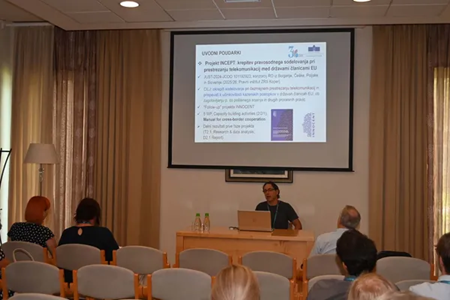The INCEPT project (Supporting Cross-border Judicial Cooperation in Cases Related to the Interception of Telecommunications, JUST-2024-JCOO-101192923) was presented at the Security Science Days 2025 national conference, held in Zreče from 4 to 5 June 2025.
Launched this year by an international consortium of research organisations from Bulgaria, the Czech Republic, Poland and Slovenia, the project is based on the finding that, in the age of digital communications, telecommunications interception is a crucial tool for detecting and investigating serious and organised crime. However, Member States of the European Union face numerous legal and technical challenges in this area.

Telecommunications interception raises important questions regarding the acceptability and legality of covert investigative measures, such as secret surveillance using technical devices (GPS trackers), IMSI catchers and Trojan horses, under both national laws of the Member States and cross-border evidence gathering and transmission. In practice, the European Investigation Order (EIO) often encounters varying national approaches and insufficient harmonisation of legislation. Due to differences in implementation, technical standards and security protocols, this prolongs cross-border processes for collecting and exchanging evidence, hindering effective cooperation.
Challenges also arise when cooperating with third countries, as existing legal mechanisms do not provide clear procedures and standards for exchanging telecommunications data. The INCEPT project’s primary objective is to bolster judicial cooperation in telecommunications interception, thereby enhancing the legality and efficacy of cross-border criminal proceedings.


 en
en Slovenščina
Slovenščina Italiano
Italiano